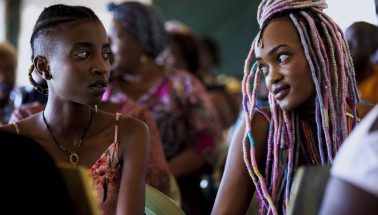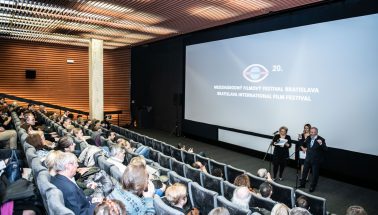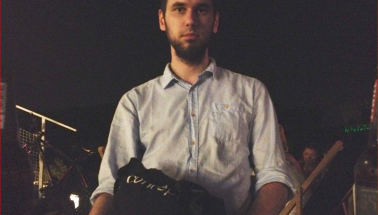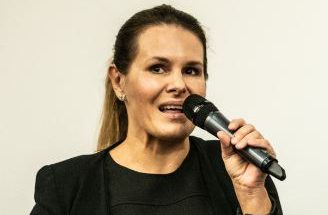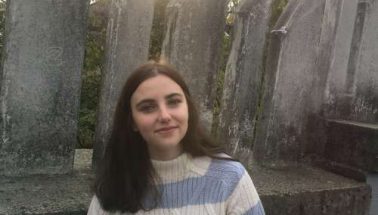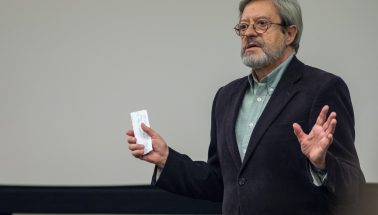The competing film selection of the Bratislava IFF’s 19th edition will once again offer a diverse range of topics and approaches rendered by several upcoming yet formally distinctive directors. They’ll compete in the sections of the first and second feature films, first and second documentary films, and shorts. The aim of the festival remains to spotlight young film and explore the contemporary world cinema for its most distinctive talents.
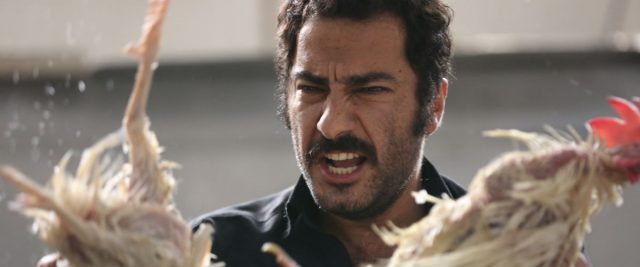
A triad of international competitions will present creators who have already reaped successes on the international festival scene as well as those just jumpstarting their international careers. The Fiction Competition will present eight films selected by the programme dramaturge, a Serbian film critic Nenad Dukić. The most successful and well-known filmmaker in the fiction Competition is the Iranian actor and director of television and documentary films Vahid Jalilvand, whose second feature fiction film No Date, No Signature (Bedoune Tarikh, Bedoune Emza, 2017) won the Best Director award in the Venice IFF’s Horizons section. The film, confirming the exceptional quality of contemporary Iranian cinema, explores the issues of culpability and responsibility in a society that dwells on the edge of the rule of law. The film examines the dilemma of a forensic pathologist Kaveh Nariman, who may have caused the death of an 8-year-old child. Jalilvand’s feature debut, Wednesday, May 9, was screened in the fiction Competition of the Bratislava IFF two years ago.
Another important event will be the introduction of Jeune Femme (Montparnasse Bienvenue, 2017), the debut film of the French film director Léonor Serraille. The film, awarded with Caméra d’Or for the best debut of the festival in Cannes, follows the lonely and humbled Paula, recently left by her boyfriend and ignored by all of her friends and acquaintances. Accompanied by a fantastic soundtrack, the outraged and emotion-whipped woman sets out on a comic as well as dramatic journey to rediscover independence and peace. The film, set in the Parisian neighbourhood of Montparnasse on the Seine’s left bank, was made with a modest budget and an almost entirely female crew.
The military conflict in former Yugoslavia stands in the focus of Men Don’t Cry (Muškarci ne plaču, 2017), which won Special Jury Prize at the most recent edition of the Karlovy Vary IFF. The film reflects the war through a collective memory of a group of middle-aged war veterans, joining for an extended group therapy session, a “reconciliation course”, conducted by a Slovenian psychiatrist, Ivan. This civil as well as authentic star-studded film explores the ability to forgive others as well as ourselves.
Programmer Nenad Dukić presents the Fiction Competition
The Documentary Competition, compiled by the programme director Pavel Smejkal, will again feature eight thematically and formally daring films. One of them is a feature debut of the Norwegian director and DP Egil Håskjold Larsen, 69 Minutes of 86 Days (69 minutter av 86 dager, 2017). At an unspecified port, a three-year-old girl Lean and her family appear in a crowd of refugees. We follow the girl, brimming with curiosity and energy, on her exhausting journey through Europe, while she holds on to her childlike ability to normalize her days. The film was awarded Nordic Dox Prize at this year’s CPH:DOX as well as the Emerging International Filmmaker Award at Hot Docs 2017.
Another film related to the Middle East region is Taste of Cement (Taste of Cement, 2017) by the Syrian film director Ziad Kalthoum. Another festival hit, nominated for the European Film Award and a fresh winner of the prestigious Doc Alliance Selection Award, tells the story of Syrian construction workers building skyscrapers in Beirut. The story of men cut off from the outside world as well as their homeland dwells on the verge of film essay and poetry, confirming Kalthoum’s reputation as one of the most original young filmmakers of his region.
Another significant achievement in the Documentary Competition is Bobbi Jene (Bobbi Jene, 2017), a portrait of a genius dancer, which seamlessly blends a dance documentary with a love story. The film follows its heroine from the moment she decides to leave Israel, where she is a star of a world-famous dance troupe Batsheva, and sets out on a path of solo career, crossing the borders of her own comfort zone and eventually the boundaries of dance as such. The second film of the Danish director Elvira Lind, the winner of the Best Documentary Feature, Best Cinematography and Best Editing in a Documentary Feature awards at the Tribeca festival, is interesting in its skilful narration and formal simplicity that brings out the heroine’s talent and openness.
This year again, thanks to The Shorts Competition, the festival audience can get acquainted with the most remarkable short films selected by the Dutch curator Erwin Houtenbrink. This year’s selection comprises fourteen titles. The Thai filmmaker Chai Siris, who works in the studio of the famous Apichatpong Weerasethakul, comes with the film 500, 000 years (500,000 pee, 2017), which takes place somewhere on the borders of reality, myth and film art. The film High Cities of Bone (Altas Cidades de Ossadas, 2017), follows Karlon, a pioneer of creole rap living in a slum on the outskirts of Lisbon. The film is an imaginative exploration of Karlon’s memories, institutional siege, and submerged stories. The main asset of the animated short Call of Cuteness (Call of Cuteness, 2017) is the combination of fantasy and reality. It tells a story of a neoliberal nightmare, consumerism, control and the fear of pain. Although it uses radically formal resources, the film remains visually captivating and playful.
Programmer Erwin Houtenbrink presents the Shorts Competition

